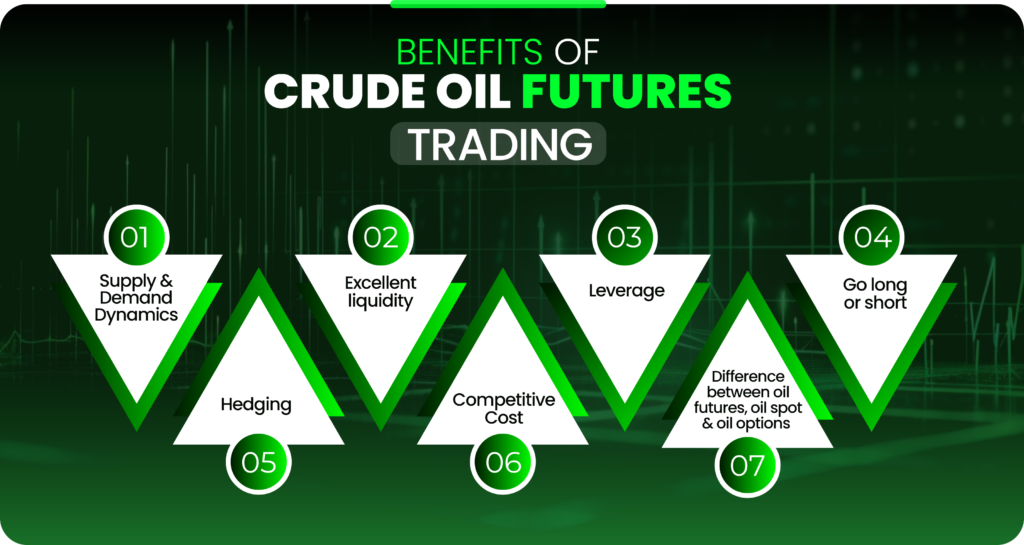Are you looking for a way to trade in crude oil? If yes then this article is for you. Here, we will discuss the most popular financial contract: crude oil futures with examples, benefits, and what makes them different from their alternatives. So stay tuned.
What are crude oil futures?
A crude oil future is a financial contract for trading oil at a predetermined quantity and price at a future date.
Oil Futures are amongst the most popular financial derivative that allows traders to predict the oil’s future price movement and make money from the speculation. Under this, both the parties are agreed to execute the trade on a future date.
An Oil future agreement gives buyers and sellers the obligation to buy and sell the oil in a specific quantity before the future contract expires.

Elements of Oil Future Contract
Crude oil future is a type of contract that means the agreement comes with certain specifications or conditions. If you want to start trading in oil futures, having a clear idea of the contract specification details is a must. However, no need to worry. Here is a list of all the crucial components of oil futures explained:
Type of Contract
When it comes to the oil market, there are mainly two contracts WTI and Brent. WTI is the benchmark for trading oil futures at North America’s New York Mercantile Exchange while Brent crude is the benchmark for trading oil futures in Africa, Europe, and the Middle East at Intercontinental Exchange.
Date of Delivery
It is the crude oil expiry date. It specifies the time when the agreement between the buyer and seller will mature or the delivery of the oil will made.
Contract Size
The oil future contract specifies the quantity or the number of barrels that will be delivered at the expiry or maturity date. Generally, for oil trading, the quantity will be measured in barrels.
Future Price
The future price is at which the buyer agrees to buy, or the seller agrees to sell the oil at a maturity date if the contract did not close or offset.
A quick glance
A crude oil future is a financial contract to buy and sell oil at a predetermined quantity and price at a future date.
Crude Oil is amongst the most popular and profitable commodity products to trade in. It can be traded in spot, future, and option markets.
WTI is traded at North America’s New York Mercantile Exchange, while Brent crude oil is traded at Intercontinental Exchange.
Contract Specification
Date of Delivery
Contract Size
Future Price
Contract Settlement
Margin Requirement
Yes, spreads are quite high with future contracts; however, there are no swap charges.
Contract Settlement
It deals with the settlement specification of the contract in case it is not offset or closed. Oil futures allow traders to settle the contract in cash or physical oil delivery. Also, in the case of physical delivery, the specifications include delivery locations.
Margin Requirement
The margin specifications, like the initial margin, free margin and margin maintenance to execute the contract, are also included. Generally, your exchange and contract specification has an impact on your margin requirement.
Crude Oil Futures Examples
We have a brief overview of crude oil futures for a better and more practical understanding of its concept. Here is an example of crude oil futures trading:
A trader feels that the crude oil price is set to rise in the upcoming month, so he entered the future contract for WTI on the 1st of May 2024. The future contract specifications are as follows:
Date of Contract: 1st May 2024
Delivery Date: 1st July 2024
Quantity: 1000 Barrels
Price: 80$ per Barrels
In this case, suppose his prediction went right and the price of oil rose to 85$. Now, he can sell the WTI contract before the end of the contract or take oil delivery at 80$ in the future market and sell it for 85$ in the spot market. He will make a profit of 5$ per barrel, which is around 5000$.
With the chance of profit, the chance of losses is also there. So, suppose the price of oil falls to 75$. In this case, he can either close the WTI contract before the expiry at a loss of 5$ per trade or wait for the expiry date to deliver oil at a higher rate than the current price.

Why trade crude oil futures
The oil futures market is growing rapidly due to high returns and enormous benefits. However, if you think whether it is a good option for you or not, let us discuss the benefits of oil futures:
Supply and Demand Dynamics
Oil is amongst the most profitable commodity products. Crude oil prices rise and fall due to factors like war, diplomatic relations, extraction, production-related, etc. A future contract is the best way to watch these aspects and take advantage when the supply and dynamic changes.
Excellent liquidity
When you are trading in any financial asset, market liquidity is the key aspect to check. It enables traders to enter and exit the market easily, and future contracts provide traders with excellent liquidity.
Leverage
You may have heard of leverage if you are an active trader. It is the most important aspect of trading in financial markets. With crude oil future contracts, you can get a good leverage ratio. So, even with a small amount of capital, future traders can enter into big trades.
Go long or short
Oil future contracts enable traders to take advantage of rising and falling oil prices. Traders can enter into a buying contract when they feel the oil price rises and enter into a selling contract when they feel the oil price will fall.
Hedging
Oil futures is a great way to hedge your risk due to unexpected rises or falls in oil prices. Suppose you want to buy oil after two months, but you fear that the price will rise unexpectedly at that time.
In this case, you can enter a future contract for buying oil at your desired price, so if the price rises, you can buy the oil at the future contract price even after two months.
Competitive Cost
Another benefit of future trading is the trading fees are competitive to traders’ pockets. Also, usually in trading, commodity brokers generally have overnight holding fees or charges for holding trades. However, with future contracts, you don’t need to worry about these additional fees.
Difference between oil futures, oil spot and oil options
Crude Oil is amongst the most popular and profitable commodity products to trade in. It can be traded in spot, future, and option markets. However, if you are wondering how these three are different from each other, here are the key points:
| Point of Difference | Crude Oil Futures | Crude Oil Spot | Crude Oil Options |
|---|---|---|---|
| Meaning | Crude Oil future is an agreement between buyers and sellers to buy or sell oil at a specific price and quantity on a future date. | As the name suggests, crude oil spot trading deals with buying or selling oil on the spot or immediately. | Oil options provide buyers with an option, not the obligation, to buy oil at a predetermined price at a specified date. |
| Trading Cost | Spreads are quite high with future contracts; however, there are no swap charges. | Spreads are low but overnight charges are also there. | You need to pay a significant amount premium for options trading. |
| Risk | The margin requirement and leverage can make the game of future trading quite risky. | Spot trading is comparatively less risky than futures; however riskier than options. | Under this, you need to pay the premium amount if the price does not move in your favour. So, the risk is low and measurable. |
| Objective | A person can enter into a future contract for profit speculation or hedging. | Spot trading is generally used to make a profit from speculations. | Options contracts are used for a range of trading styles, including hedging, speculations and many others. |
| Complexity | Future contracts can be complex with a number of elements like quantity, quality, margin, maturity date, etc. | Spot contracts are instant, so these are less time-consuming and complex. | Compared to the Future, options are less complex and offer traders flexibility. |
Wrapping Up
Crude oil futures can allow individual investors to participate in one of the world’s most profitable commodity markets. With the range of benefits, these financial derivatives are suitable for diverse trading strategies.
However, oil futures also have some disadvantages like margin requirement, high volatility, slippage, physical delivery obligation, etc. So before diving into the future market, first have an in-depth knowledge of how to trade oil.
Also, with knowledge, proper planning, and the right strategy, oil future trading can give you enormous returns. Enhance your knowledge with our comprehensive educational resources and dive into the future world.

